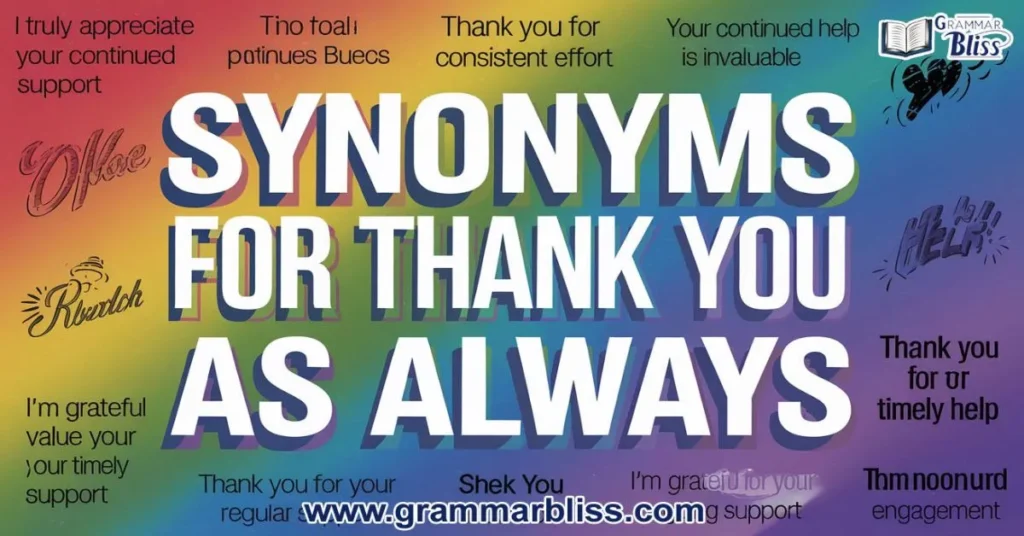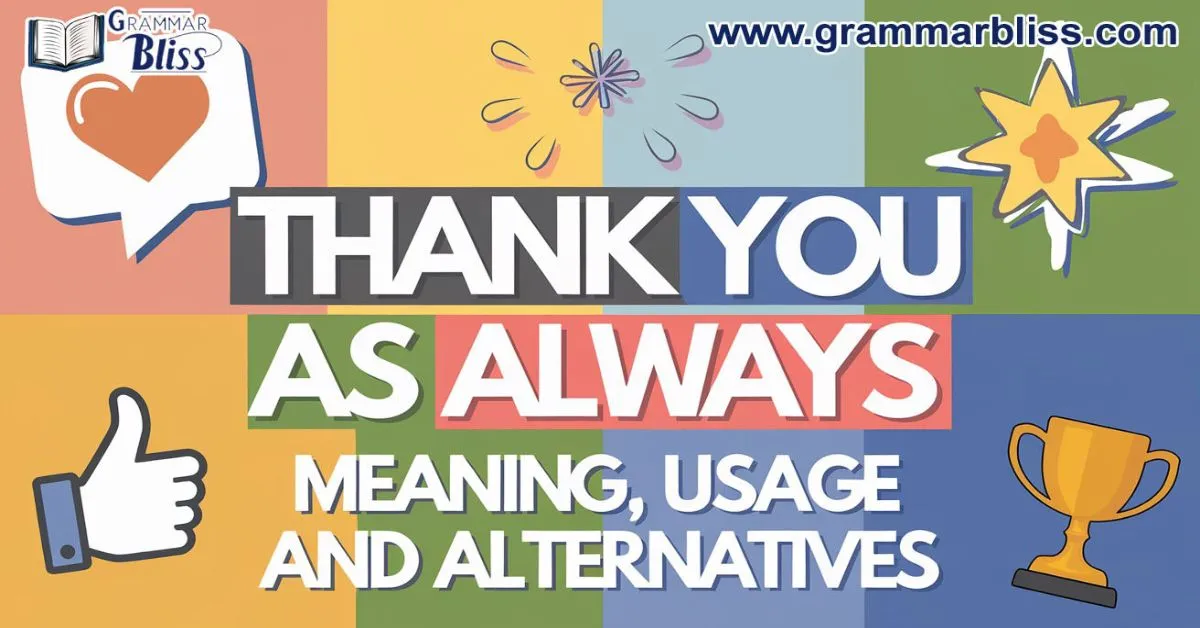“Thank You As Always” is a phrase often used in professional communication to express ongoing gratitude and acknowledge someone’s consistent support or contributions. It conveys appreciation for their reliable help and effort, making it an important phrase in fostering strong professional relationships.
While commonly used, it’s essential to understand when and how to use it effectively to avoid sounding repetitive. Here, we will explore the meaning, usage, and potential advantages and disadvantages of Thank You As Always, along with synonyms you can use to express appreciation in various professional settings.
Whether in emails, meetings, or daily interactions, learning the right way to say thank you enhances your workplace communication.
Quick Summary
We will break down the phrase “Thank you as always” to help you understand when and how to use it appropriately in professional settings. We will discuss its meaning, explore its advantages and disadvantages, and offer useful alternatives to ensure you express gratitude in a professional yet sincere manner. Whether you are thanking a colleague for consistent help or expressing appreciation for reliable teamwork, you’ll learn how to make your messages stand out and feel more personal. We’ll also touch on important grammar rules and provide examples of how to use these expressions properly.
Read: say-your-peace-vs-say-your-piece-understanding-the-difference/
Meaning of “Thank You As Always”

The phrase “Thank you as always” is often used to acknowledge someone’s reliable and consistent support. It shows that you value their ongoing contributions and effort over time. When you say “Thank you as always,” you’re not just expressing appreciation for a one-time action; you’re acknowledging their recurrent help and the dedication they show, day after day, in their work.
This expression is commonly used in workplace communication to maintain a sense of trust and camaraderie between co-workers, team members, or clients. It reinforces that you appreciate their continuous cooperation and input, creating a positive relationship. For example, if you work with someone who consistently meets deadlines or provides valuable feedback, saying “Thank you as always” shows you recognize and appreciate their reliability.
Usage of “Thank You As Always”
You’ll most often hear “Thank you as always” in situations where someone has helped you repeatedly or is known for being a dependable and supportive partner. It works well in emails, messages, and even face-to-face interactions when you want to convey appreciation without sounding overly formal or distant.
Let’s say you are working on a team project and a colleague has been helping you with timely responses and offering reliable feedback. In this case, saying “Thank you as always” is a great way to acknowledge their consistent contribution and the support they provide throughout the project. It shows you’re not just thanking them for a single task, but for their ongoing dedication to the work.
The phrase also works well when expressing gratitude for consistent assistance or recurring contributions. It’s a polite expression that highlights appreciation for someone who is always willing to help. However, if the person’s help is particularly significant or specific, you might consider using a more tailored expression to give them more recognition.
“Thank You As Always”: Is It Professional to Say?
Many people wonder whether “Thank you as always” sounds professional enough for workplace communication. The answer depends on the context. In most situations, using this phrase is perfectly acceptable in professional settings, especially when addressing someone with whom you have a positive work relationship. It conveys both appreciation and respect for their ongoing effort.
However, it’s important to consider the tone of the message. If you are communicating with a supervisor or someone in a more formal capacity, you might want to adjust your expression. In such cases, you could opt for a slightly more formal thank you phrase, such as “I sincerely appreciate your continued support” or “Your assistance has been invaluable as always.” These alternatives maintain the professional tone while still conveying gratitude.
In a casual work environment, “Thank you as always” is entirely appropriate. It keeps the communication light yet professional, and it shows that you’re genuinely acknowledging someone’s consistent help without sounding stiff or overly formal.
Learn: minute-or-minuet-understanding-the-difference/
Advantages and Disadvantages of “Thank You As Always”
Advantages of “Thank You As Always”
- Builds Consistency in Gratitude: It shows you appreciate someone’s consistent and reliable contributions over time.
- Reinforces Positive Relationships: Regular use helps maintain strong, trusting relationships with colleagues, clients, or team members.
- Sincere Acknowledgment: It acknowledges ongoing support, making the recipient feel valued for their continuous effort.
- Simplicity: The phrase is easy to use and works in both formal and informal settings.
- Boosts Morale: It helps boost the recipient’s confidence by showing their hard work and effort are noticed.
Disadvantages of “Thank You As Always”
- May Sound Impersonal: If overused, it can become repetitive and formulaic, lacking genuine personalization.
- Lacks Specificity: The phrase doesn’t recognize the unique contributions of an individual or their specific effort in a situation.
- Can Appear Unthoughtful: In some cases, it might seem like a generic acknowledgment rather than a thoughtful thank you.
- Repetitive in Long-Term Use: Using the same phrase for long-term appreciation can make it feel habitual, reducing its impact.
- May Not Suit Formal Contexts: In very formal business environments, more specific or formal expressions of gratitude might be more appropriate.
Synonyms for “Thank You As Always”

If you’re looking for alternatives to “Thank you as always,” here are some phrases that convey a similar sentiment:
1. I Truly Appreciate Your Continued Support
- Meaning: Acknowledges long-term help or effort.
- Example: “I truly appreciate your continued support throughout the project.”
2. Thank You for Your Consistent Effort
- Meaning: Acknowledges someone’s dependable contributions.
- Example: “Thank you for your consistent effort in keeping the team on track.”
3. I’m Grateful for Your Ongoing Assistance
- Meaning: Acknowledges someone’s help over time.
- Example: “I’m grateful for your ongoing assistance with the reports.”
4. I Appreciate Your Unwavering Commitment
- Meaning: Recognizes dedication that doesn’t falter.
- Example: “I appreciate your unwavering commitment to the team’s success.”
5. Your Continued Help Is Invaluable
- Meaning: Highlights how important their help is over time.
- Example: “Your continued help is invaluable during these busy times.”
6. I’m Always Thankful for Your Reliable Support
- Meaning: Shows gratitude for someone’s consistent dependability.
- Example: “I’m always thankful for your reliable support with our clients.”
7. I Appreciate Your Steady Contributions
- Meaning: Acknowledges consistent input or work.
- Example: “I appreciate your steady contributions to the marketing campaign.”
8. Thank You for Your Persistent Assistance
- Meaning: Recognizes someone’s continual help.
- Example: “Thank you for your persistent assistance with the project deadlines.”
9. I’m Grateful for Your Timely Help
- Meaning: Thanks someone for always being on time with help.
- Example: “I’m grateful for your timely help in submitting the report.”
10. Thanks for Your Ongoing Dedication
- Meaning: Acknowledges dedication that continues over time.
- Example: “Thanks for your ongoing dedication to this initiative.”
11. I Appreciate Your Dependable Support
- Meaning: Recognizes someone’s reliable assistance.
- Example: “I appreciate your dependable support throughout the year.”
12. Your Regular Contributions Mean a Lot
- Meaning: Acknowledges repeated input.
- Example: “Your regular contributions mean a lot to the success of the project.”
13. I’m Grateful for Your Steady Involvement
- Meaning: Recognizes consistent participation.
- Example: “I’m grateful for your steady involvement in the team meetings.”
14. Thank You for Always Coming Through
- Meaning: Acknowledges someone’s constant reliability.
- Example: “Thank you for always coming through with the deliverables on time.”
15. I Appreciate Your Ongoing Engagement
- Meaning: Thanks someone for continuous participation.
- Example: “I appreciate your ongoing engagement in our brainstorming sessions.”
16. Your Commitment Continues to Be Appreciated
- Meaning: Expresses appreciation for their ongoing dedication.
- Example: “Your commitment continues to be appreciated by the entire team.”
17. I’m Thankful for Your Continued Effort
- Meaning: Recognizes someone’s persistent effort.
- Example: “I’m thankful for your continued effort in making the event a success.”
18. Thank You for Your Consistent Assistance
- Meaning: Acknowledges ongoing help over time.
- Example: “Thank you for your consistent assistance in managing the tasks.”
19. I Truly Value Your Regular Support
- Meaning: Shows high regard for someone’s recurring help.
- Example: “I truly value your regular support during the busy seasons.”
20. I Appreciate Your Constant Contribution
- Meaning: Thanks someone for their continuous input.
- Example: “I appreciate your constant contribution to the project’s success.”
21. Thank You for Always Being There
- Meaning: Acknowledges someone’s dependable presence.
- Example: “Thank you for always being there when I need help with client issues.”
22. I’m Grateful for Your Unfailing Support
- Meaning: Thanks someone for support that never stops.
- Example: “I’m grateful for your unfailing support in meeting deadlines.”
23. Thanks for Your Continued Feedback
- Meaning: Recognizes someone’s recurring input.
- Example: “Thanks for your continued feedback on the product designs.”
24. I Appreciate Your Continued Participation
- Meaning: Acknowledges someone’s ongoing involvement.
- Example: “I appreciate your continued participation in the weekly meetings.”
25. Thank You for Your Ongoing Engagement
- Meaning: Recognizes continuous interest or involvement.
- Example: “Thank you for your ongoing engagement with the client presentations.”
26. I’m Always Thankful for Your Support
- Meaning: Expresses ongoing gratitude.
- Example: “I’m always thankful for your support in every aspect of the project.”
27. Thank You for Your Persistent Dedication
- Meaning: Thanks someone for dedication that doesn’t waver.
- Example: “Thank you for your persistent dedication to improving the process.”
28. I Appreciate Your Steady Feedback
- Meaning: Acknowledges continuous feedback.
- Example: “I appreciate your steady feedback on the marketing strategy.”
29. Thanks for Your Regular Help
- Meaning: Acknowledges constant assistance.
- Example: “Thanks for your regular help in coordinating the team.”
30. I’m Grateful for Your Reliable Contributions
- Meaning: Recognizes someone’s dependable involvement.
- Example: “I’m grateful for your reliable contributions to the team’s goals.”
31. Thank You for Your Ongoing Partnership
- Meaning: Expresses gratitude for a lasting partnership.
- Example: “Thank you for your ongoing partnership in this joint venture.”
32. I Appreciate Your Recurrent Input
- Meaning: Thanks someone for their consistent input.
- Example: “I appreciate your recurrent input during our brainstorming sessions.”
33. I’m Grateful for Your Regular Commitment
- Meaning: Acknowledges someone’s constant dedication.
- Example: “I’m grateful for your regular commitment to quality work.”
34. Thank You for Your Reliable Effort
- Meaning: Recognizes someone’s dependable contributions.
- Example: “Thank you for your reliable effort in meeting all the deadlines.”
35. I Appreciate Your Ongoing Collaboration
- Meaning: Acknowledges consistent teamwork.
- Example: “I appreciate your ongoing collaboration on this project.”
36. Your Help Is Always Valued
- Meaning: Expresses appreciation for someone’s reliable assistance.
- Example: “Your help is always valued when we face challenges in the office.”
37. I’m Grateful for Your Constant Commitment
- Meaning: Acknowledges someone’s unchanging dedication.
- Example: “I’m grateful for your constant commitment to maintaining high standards.”
38. Thank You for Your Steady Cooperation
- Meaning: Thanks someone for their ongoing cooperation.
- Example: “Thank you for your steady cooperation in this challenging task.”
39. I Appreciate Your Unchanging Support
- Meaning: Expresses gratitude for someone’s unwavering help.
- Example: “I appreciate your unchanging support through all the changes we’ve gone through.”
40. Thank You for Your Consistent Participation
- Meaning: Acknowledges someone’s ongoing participation.
- Example: “Thank you for your consistent participation in our team discussions.”
Explore: you-got-this-understanding-and-using-this-phrase-effectively/
Grammar Rules and Examples
When using “Thank you as always” in emails or other professional communication, it’s essential to use it correctly. For example, you would say, “Thank you, as always, for your consistent feedback.” Notice the commas surrounding “as always,” which helps the sentence flow smoothly and emphasizes the recurrent nature of the gratitude.
If you’re using the phrase as a standalone sentence, it’s important to follow standard grammar rules. For example:
- “Thank you as always for your prompt responses.”
- “As always, I truly appreciate your timely assistance.”
These examples follow proper grammar, ensuring your message comes across clearly and professionally.
FAQ’s
What does “Thank You As Always” mean?
It’s a phrase used to express gratitude for someone’s consistent and dependable support over time.
Is it professional to say “Thank You As Always”?
Yes, it’s professional as long as it’s used in the right context, acknowledging ongoing support.
When should I use “Thank You As Always”?
Use it when expressing appreciation for someone who consistently assists or contributes positively.
Are there alternatives to “Thank You As Always”?
Yes, you can say “I truly appreciate your ongoing support” or “Thank you for your continued assistance.”
Can “Thank You As Always” sound impersonal?
Yes, if overused, it may sound repetitive and lack personal touch.
Conclusion
“Thank You As Always” is a simple yet powerful phrase to express ongoing gratitude and acknowledge someone’s consistent support. While it works well in many professional settings, it’s important to use it thoughtfully to avoid sounding repetitive or impersonal. By exploring synonyms and understanding the context, you can ensure your appreciation feels sincere and meaningful.
Remember, expressing appreciation in a professional tone not only strengthens relationships but also promotes a positive work culture built on trust, teamwork, and mutual respect.

